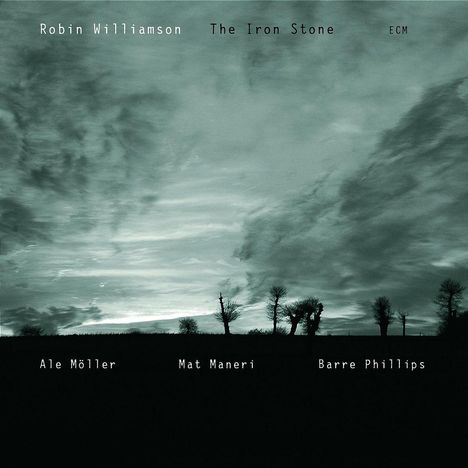Robin Williamson: The Iron Stone auf CD
The Iron Stone
Herkömmliche CD, die mit allen CD-Playern und Computerlaufwerken, aber auch mit den meisten SACD- oder Multiplayern abspielbar ist.
- Label:
- ECM
- Aufnahmejahr ca.:
- 2005
- Artikelnummer:
- 9636861
- UPC/EAN:
- 0602498764411
- Erscheinungstermin:
- 12.10.2014
The Iron Stone” is the third of Scottish singer / songwriter Robin Williamson’s explorations of sung poetry on ECM and follows “The Seed-At-Zero” (2000) and “Skirting the River Road” (2002), the first a meditation on Dylan Thomas and other Welsh writers, the second including settings of the visionary poetry of William Blake and Walt Whitman. The new album has a wider embrace, with verse of Walter Raleigh, Thomas Wyatt, John Clare and Ralph Waldo Emerson, plus traditional folk music, and improvisations – as well as Williamson’s own poetry and songs, including two titles he once sung with the Incredible String Band in their most creative period: “The Iron Stone” and “The Yellow Snake”, both from 1968.
Robin Williamson’s ISB, one of the most wildly original ensembles of its era, continues to be a touchstone for consecutive generation of musicians, currently cited as an inspiration by singers and groups of the new folk movement (which the mainstream press is variously calling psychedelic folk or freak folk) on both sides of the Atlantic. Williamson himself, though, has moved on – into increasingly fascinating collaborations with musicians from other idioms, particularly from the worlds of jazz and free improvised music, players fully capable of matching his wayward imagination to create songs in the moment or of joining him in the renewal of traditional forms (as on an extraordinary interpretation of the medieval Scots ballad “Sir Patrick Spens” here).
Recorded in Abergavenny, Wales, (in the loft of an 18th century mill house, maintained as a studio by folk musician – and assistant engineer here – Dylan Fowler), “The Iron Stone” continues the association begun with viola player Mat Maneri and multi-instrumentalist Ale Möller on “Skirting the River Road”, and adds to the group the great bassist Barre Phillips, who quickly gets to the heart of things.
Phillips and Mat Maneri have often worked together (as on their ECM discs with saxophonist Joe Maneri) and have developed a near-telepathic musical understanding. Interweaving their sounds and lines or framing the arpeggios of Williamson’s Celtic harp they develop the group as an improvising chamber ensemble with a reach from folk-baroque (“Even Such Is Time”, “Loftus Jones”) to ‘abstract’ spontaneous composition (“There Is A Music”, “Henceforth” and more). Ale Möller, meanwhile, is more than a colourist par excellence, a crafter of moods and atmospheres with his many flutes and whistles, his accordion, mandola and more...
Born in Edinburgh in 1943 Williamson has been a professional musician since he was 16 years old, and an innovator from the outset. He and Bert Jansch brought new impulses to British folk at the beginning of the 1960s. Then, with Clive Palmer and Mike Heron, Williamson founded the Incredible String Band whose songs, cross-referencing diverse cultures and with liberal use of ‘exotic’ instruments suggested a proto-‘world music’. The group’s most outstanding attribute was perhaps Williamson’s extraordinary melismatic vocals, at that time influenced by Arab and Indian singers as well as the great traditional folk singers of Scotland and Ireland. The ISB had several best-selling albums, including “The Hangman’s Beautiful Daughter”, a top 5 hit in the UK pop charts, and toured widely. After the group’s break-up in 1974 Williamson relocated to California where he published a novel, books of poetry and music instruction manuals, then resumed active music making as leader of the Merry Band. In the 1980s, back in Britain and now playing harp as his main instrument, he was a key figure in the storytelling revival. Through the 1990s he issued a number of albums on his own record label, Pigs Whisker Music, before coming to ECM. His recent live work has emphasized two duos, with his wife, singer Bina Williamson and with guitarist John Renbourn. He has also played a number of concerts with saxophonist Paul Dunmall.
Ale Möller (born 1955), grew up in Malmö in Southern Sweden. Once a jazz trumpeter and guitarist playing swing and bebop, he left for Greece to study the bouzouki and the roots of rembetika, finally penetrating Greek music so thoroughly that he became a part of Theodorakis’s ensemble. On returning to Sweden he spent a decade investigating Swedish indigenous music in the Dalarna region, ‘translating’many fiddle tunes for the mandola and in the process contributing powerfully to the Swedish folk revival. He has co-directed recordings on ECM with singer Lena Willemark (“Nordan”, “Agram”, “Frifot”) as well as appearing on Robin’s “Skirting The River Road”. His own multi-cultural World Heritage Orchestra has been widely acclaimed.
Mat Maneri was born in Brooklyn in 1969 and first began playing improvised music with his father, the inventive jazz saxophonist / clarinettist and microtonal composer / theorist Joe Maneri. Mat has appeared on five albums with Joe for ECM (“Three Men Walking”, “In Full Cry”, “Blessed, “Tales of Rohnlief” and “Angles of Repose”, the last two also featuring Barre Phillips), and also has a solo violin album, “Trinity” on the label. Other musicians with whom he has played recently include Cecil Taylor, Gary Peacock, Paul Motian, and Tomasz Stanko. Synthesising influences from Miles Davis and John Coltrane and from baroque music to Elliott Carter via the Schönberg / Berg / Webern Vienna School, Mat Maneri has become a uniquely expressive player. He continues to lead a number of bands of his own and has recently been emphasising a quartet with pianist Dave Burrell and drummer Randy Peterson.
Barre Phillips, born 1934 in California, has been at the forefront of developments in improvised music over the last four decades. Ornette Coleman set him on his path around 1960, and on his arrival in New York, Phillips was soon working the extremes of the New Thing – playing improvised chamber music with Jimmy Giuffre on the one hand and freely expressive 'fire music' with Archie Shepp on the other. In 1969 he co-founded the powerhouse group called The Trio with John Surman and Stu Martin, which also appeared on his 1975 “Mountainscapes” album for ECM. His first recording for the label, however, was the duo album “Music for Two Basses” with Dave Holland. After further ECM recordings with Surman, and with Terje Rypdal, and the solo “Call Me When You Get There”, Phillips experimented with music for bass, percussion and tape on “Aquarian Rain” and mediated between Evan Parker and Paul Bley on “Time Will Tell” and “Sankt Gerold”. Based in France since 1972, Phillips has played with all the leading musicians in European improvisation. His current priorities include a trio with saxophonist Urs Leimgruber and pianist Jacques Demierre, which recently released an album on Evan’s Parker’s PSI label. He hasn’t often worked with singer / songwriters, but did contribute to Daevid Allen’s historic 1969 recording “Magick Brother”.
Pressestimmen:
he title track comes from Williamson’s years with the Incredible String Band but the mood on his third album for ECM is, like the austere cover landscape, the antithesis of hippy summer. Flitting between roles as storyteller, folk traditionalist, bard and experimental musician, Williamson offers up wintry meditations on mortality. The doomy Scots ballad ‘Sir Patrick Spens’ is here, along with Celtic harp settings for poems by Raleigh and Wyatt and a Betjemanesque reflection on early days. Set to inventive acoustic arrangements … it’s an album of flinty integrity from an old master. Neil Spencer, The Observer
The Iron Stone finds nature out of tune with itself, man thrown against its iron hard landscapes alone, puny, cold. This, in Williamson’s own words is ‘wonderful and grim music’. Familiar traditional tunes like ‘Sir Patrick Spens’ are recast in coarse tunings, contemporary visions like ‘Political Lies’ are bitter, and even the love songs like ‘Verses At Ellesmere’ are the cries of a drowning man gripping tight the life raft. Moments of redemption are rare but the more striking for their scarcity … Grim but wonderful indeed. Andy Robson, Jazzwise
Williamson, ein Meister der Phrasierung und Kenner traditioneller Folk-Gesangsstile, griff bei den unter dem Vorzeichen freier Improvisation stehenden Sessions vor allem zur keltischen Harfe und zu diversen Flöten. Das Ergebnis überzeugt erneut durch seine atmosphärische Dichte, Spielfreude und Experimentierfreudigkeit, ohne auch nur ansatzweise prätentiös zu wirken. Karl Gedlicka, Concerto
Wie schon bei den ersten beiden ECM-CD singt Williamson teils improvisierte, teils ausgeschriebene Melodien. Dazu improvisieren Viola-Spieler Mat Maneri, Bassgeiger Barre Philipps und Multiinstrumentalist Ale Möller mit großem Feingefühl eigentümliche Klangsphären, aus denen unversehens urtümlich wirkende Melodien schimmern. ... Mit diesem Impro-Jazz-Folk pflügen Williamson und Konsorten eine frische Scholle. Hanspeter Künzler, Neue Zürcher Zeitung
Seit einigen Jahren veröffentlicht Williamson auf ECM und hat eine komplexe und eigenständige Form von Folk-Jazz entwickelt, deren vorläufiger Höhepunkt nun mit The Iron Stone erreicht ist. Unterstützt wird Williamson dabei von illustren Begleitmusikern, die dafür sorgen, dass der Folk-Touch immer wieder durch (freie) Improvisationen aufgebrochen wird... Williamson, der hier Texte von Sir Walter Raleigh, Thomas Wyatt, Turlough O’Carolan oder Ralph Waldo Emerson mal als gewiefter Geschichtenerzähler, mal meditativ selbstversunken mit seiner unverwechselbaren, keltische, arabische und indische Einflüsse mischenden Stimme interpretiert, spielt Harfe und diverse Flöten. Und mit „Political Lies“ hat er sogar einen kleinen Hitsong im Repertoire. Ulrich Kriest, Stuttgarter Zeitung
Disk 1 von 1 (CD)
-
1 The Climber
-
2 Sir Patrick Spens
-
3 Wyatt's Song of Reproach
-
4 There Is A Music
-
5 Even Such Is Time
-
6 The Iron Stone
-
7 The Badger
-
8 Political Lies
-
9 The Yellow Snake
-
10 Loftus Jones
-
11 Bacchus
-
12 The Praises of the Mountain Hare
-
13 To God In God's Absence
-
14 Verses at Ellesmere
-
15 Henceforth
Mehr von Robin Williamson





